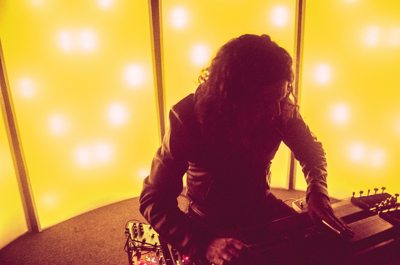
When Nashville pedal-steel guitarist Luke Schneider decided to make his first solo record, he didn’t draw from the well of the city’s famed country music. Schneider’s forthcoming full-length Altar of Harmony depicts a post-country Nashville that the Ohio-born instrumentalist has helped create over the past two decades. Altar of Harmony is meditative music that evokes the work of New Age and ambient music figures like Harold Budd and Don Robertson, the latter a New Age pioneer who currently lives in Nashville. Still, Schneider is a versatile musician whose work with song-oriented Nashville artists like Margo Price, Natural Child and Cortney Tidwell links him to the tradition epitomized by pedal-steel giants Buddy Emmons and Weldon Myrick, who added jazz and rock elements to country.
Schneider will perform his first show as a solo artist Thursday at Nashville performance space Drkmttr, where he’ll share the bill with ambient-popster Dream Wave and poets Dan Hoy, Ciona Rouse and Chet Weise. Although Schneider has proven himself an adept accompanist in his work with Price, Nashville alt-country singer Caitlin Rose and post-Gram Parsons group Teddy and the Rough Riders, Altar of Harmony sidesteps traditional song form. Like Emmons, Schneider brings a sharp feel for music history to his performances.
“I was wanting to write songs [that were] kind of like Elliott Smith, Neil Young and Jeff Tweedy,” Schneider tells me from a seat at Betty’s Bar & Grill, where we’re talking about his early days in Nashville. At 39, he looks back at a career that began in 1999, when he moved to town during his sophomore year at Middle Tennessee State University. In Nashville, he met guitarist William Tyler and multi-instrumentalist and producer Ryan Norris, major players in the arena of avant-garde Nashville rock, and close friends with whom he has continued to collaborate.
Schneider was born in Dayton, Ohio, and grew up in nearby Columbus. Influenced by Crosby, Stills, Nash & Young, he began studying guitar when he was 11. These days, he’s best known for playing a 1967 Emmons push-pull pedal steel, an instrument he didn’t take up until he was 21. Not long after he hit town, Schneider joined Tyler and Norris in Character, a math-y post-rock band, in which he sometimes played pedal steel. He also contributed steel to Tidwell’s 2006 full-length Don’t Let Stars Keep Us Tangled Up, which combined folk rock with ’60s Tropicália. But it was a session at now-gone Nashville studio Beech House Recording for Rose’s 2011 country-rock album Own Side Now that spurred him to get serious about pedal steel.
“[Mark Nevers] was producing that, and I was playing all the parts the way I had learned them,” Schneider says. “I wasn’t a very good steel player by any stretch of the imagination. I went in to cut my steel parts, and once I got in there to cut ’em, her and Nev had different ideas. I wasn’t good enough to come up with what they wanted on the spot.”
Woodshedding with the goal of becoming a professional pedal steel player, Schneider raised his visibility when he joined Nashville country rockers Natural Child. In the group’s 2014 track “Country Hippie Blues,” Schneider adds the kind of straight-ahead licks that Emmons might have contributed to a George Jones record.
What followed, in his work with Price, was the fulfillment of Schneider’s musical ambitions. After joining Price’s newly formed country band — she had previously sung soul with Buffalo Clover — Schneider toured and recorded with Price as she achieved worldwide recognition for her 2016 album Midwest Farmer’s Daughter. Price & Co. headlined major venues and appeared on Saturday Night Live in April 2016, an experience Schneider cites as a career highlight.
Schneider’s new music continues in the mode of Budd, Robertson and Brian Eno. Altar of Harmony has affinities with the work of pedal-steel giant Susan Alcorn, who has interpreted work by 20th-century composer Olivier Messiaen.
“Lately I’ve taken my interest in ambient music a step further, to full-on, private-issue New Age music,” he says. He cites Robertson’s 1969 album Dawn as an inspiration, and tells me he’d like to collaborate with him. He also cites the encouragement of Douglas Mcgowan, a staffer at the renowned reissue label Numero Group. Mcgowan is known to many for his work with late transgender soul pioneer and Nashvillian Jackie Shane, and he is also an expert on esoteric New Age records.
Altar of Harmony is entirely Schneider’s work, since he created all the sounds using pedal steel. It’s contemplative and abstract — qualities not usually associated with country music. As he knows, it’s a new age in Nashville, and the record suggests a possible future for the city’s music that honors the innovations of the past.





